Optimal Nutrition Guide for Pet Parrots
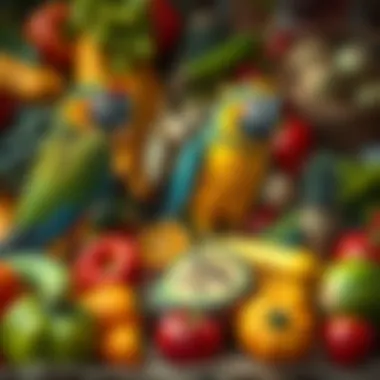
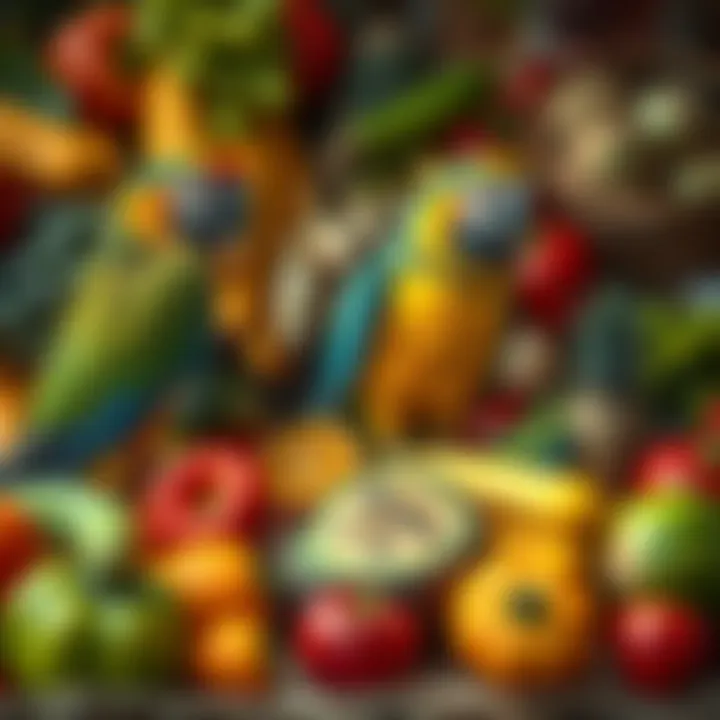
Intro
When it comes to caring for pet parrots, many owners may find themselves somewhat bewildered by the plethora of dietary options available. Unlike dogs and cats, these vibrant feathered companions have specific and sometimes complex nutritional requirements. Understanding what to feed a parrot is vital, not just for their physical health, but also for their emotional well-being. Providing a balanced diet has a direct correlation with the longevity and overall quality of life of these birds. In this comprehensive guide, we'll navigate through the essentials of avian nutrition, breaking it down into manageable pieces.
Nutrition isn’t just about food. It lays the groundwork for a parrot's health, happiness, and behavior. Be it the sprightly African Grey or the colorful Amazon parrot, getting a grip on their unique dietary needs is paramount. The right combination of seeds, pellets, fresh fruits, and veggies can lead to a harmoniously chirping household.
Avian Care Basics
Importance of Proper Nutrition
Feeding your parrot the right way is akin to laying a solid foundation for a robust house. Poor nutrition often leads to a host of problems, including feather plucking, obesity, and even organ failure. Parrots have a much longer lifespan than many might suspect—sometimes living well into their 50s or even 80s! Hence, starting off on the right foot with their diet is crucial.
Key Points:
- Diet Variety: A well-rounded avian diet should include a balanced mix of seeds, pellets, fruits, and vegetables.
- Caloric Needs: Parrots require a certain number of calories per day that varies based on species, size, and activity level.
- Hydration: Fresh water is non-negotiable. Replace their water daily to prevent bacteria from building up.
Understanding Bird Species and Their Needs
Not every parrot is cut from the same cloth. Different species have distinct dietary requirements. For instance, a cockatoo’s needs diverge significantly from those of a conure. The more one understands the specifics of their feathered friend, the better one can cater to their dietary needs. Knowledge about your bird’s natural habitat and diet can be pivotal.
- African Grey Parrots: Thrive on a diet rich in fruits and vegetables along with a small amount of high-quality pellets.
- Cockatiels: Favor seeds but should also be offered leafy greens and other veggies.
- Amazon Parrots: Enjoy a wide variety of foods, including nuts, which should only be an occasional treat due to their high-fat content.
Basics of Birds Habitat Setup
Creating a suitable environment for your parrot goes beyond just diet. Their habitat should be both safe and stimulating. A spacious cage with toys encourages movement, which ties back into their overall health. Playtime outside of the cage is just as crucial, allowing for physical activity and social engagement.
Consider incorporating:
- Perches of Different Sizes: To promote foot health and keep them engaged.
- Toys: Rotate them to maintain interest.
- Safety Measures: Ensure the cage is free from drafts and positioned away from direct sunlight.
Grooming and Hygiene Tips
An often-overlooked aspect of parrot care is grooming. Regularly bathing your parrot can help them maintain healthy feathers. Some parrot owners incorporate misting with water or providing a shallow dish for bathing.
Moreover, hygiene is key. Regularly clean the cage and replace bedding materials to avoid any health issues.
Always keep in mind that a happy parrot is a healthy parrot.
In sum, the foundation of optimal care for pet parrots begins with understanding their dietary needs and how these relate to their living conditions and grooming. As we progress through this guide, insights into the psychology and social behavior of parrots will unveil further aspects of fostering a joyous environment for your vibrant companions.
Understanding Parrot Nutrition
Understanding the nutritional needs of parrots is crucial for their overall health and well-being. These vibrant and intelligent birds have distinct dietary requirements that can vary significantly across species and individual lifestyles. Ignoring their specific needs could lead to serious health issues or nutritional deficiencies.
In essence, parrot nutrition encompasses more than just filling a bowl with seeds or pellets. It involves recognizing the balance of nutrients essential for maintaining optimal health, just like we humans pay attention to our diets. A balanced parrot diet not only promotes physical wellness but also supports mental stimulation and social interaction—two key aspects of a parrot's happiness.
The Importance of a Balanced Diet
A balanced diet for your parrot is like the foundation of a sturdy building. It ensures that every system in their body functions optimally. A variety of food sources provides the necessary proteins, carbohydrates, fats, vitamins, and minerals, which are vital for a parrot’s energy requirements and daily activities. In fact, parrots thrive on diversity in their diet, and each element plays its unique role:
- Seeds and Grains: While seeds can be a staple, they should not be the only component of your parrot’s diet. Different seeds offer different nutrients, hence a mix can spark various flavors.
- Pellets: These are specially formulated to provide balanced nutrition. A reputable pellet brand can replace or complement seeds but should be introduced gradually.
- Fresh Produce: Fruits and vegetables should be viewed as a buffet of vitamins. Fresh options like kale, carrots, and apples not only give diversity but also hydration.
- Nuts: Given sparingly, nuts can be a great source of fat and flavor—perfect for treats.
Failing to offer needed variety can lead to health issues such as obesity, fatty liver disease, and behavioral problems due to boredom. Birds that feast on just one or two types of food may not receive adequate nutrition, leading to a range of complications down the line. A suitable regimen can be a game-changer in the longevity and vibrancy of your feathery companion.
Common Myths about Parrot Nutrition
When it comes to feeding parrots, misinformation is rampant. A few misconceptions can lead to practices that are detrimental to their health. Let’s clear the air:
- Myth #1: Seeds are All They Need: While seeds can be a part of a parrot's diet, relying on them solely is like living on fast food—it’s simply not healthy. They lack essential nutrients that other food sources provide.
- Myth #2: All Fruits and Vegetables are Good: Not all produce is suitable for parrots. Some contain high levels of oxalic acid or are toxic, such as avocado and rhubarb. Research your choices to avoid mishaps.
- Myth #3: Pellets are Just for Convenience: While they are convenient, pelleted diets can be fortifying but only if they are high-quality. It’s essential to choose brands that prioritize natural ingredients without artificial colors or additives.
By debunking these myths and arming yourself with accurate knowledge, you position yourself to provide the best diet for your parrot. It’s worth remembering that what's on their plate can echo in their behavior and health, reinforcing the saying that you are what you eat.
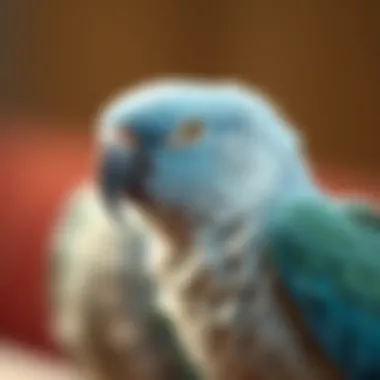
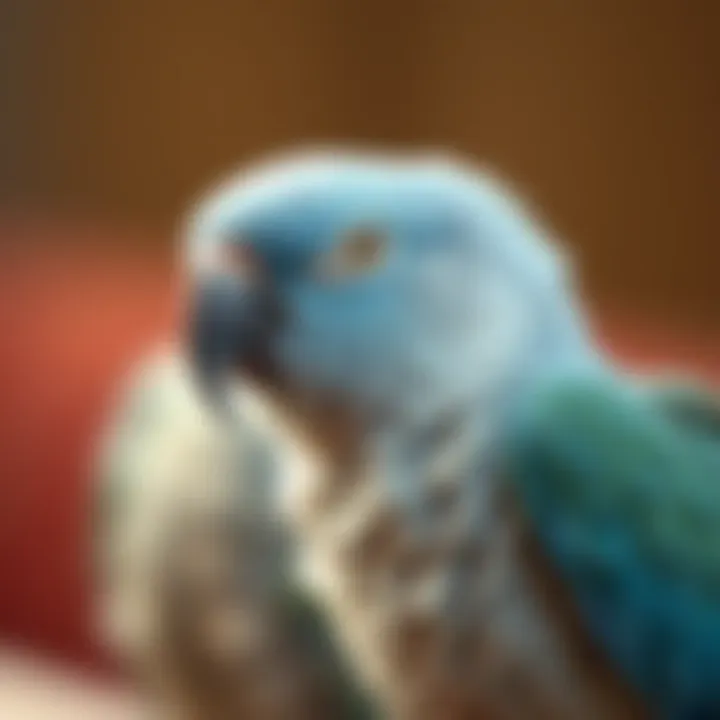
"A bird's diet reflects its life—full of variety; lacking it may lead to a cage of health problems."
For those seeking further insight, resources such as Wikipedia provide in-depth information on parrot species and their dietary habits, ensuring you have the tools necessary to make informed choices.
Types of Parrot Food
When addressing the health and well-being of pet parrots, one cannot overlook the significance of their diet. The types of parrot food available enhance not only their physical health but also their behavioral stability. Each category offers distinct benefits and nutritional requirements that cater to the diverse needs of various species. Understanding these types is essential for any parrot owner aiming for optimal nutrition.
Seed Mixes: A Traditional Choice
Seed mixes have long been the go-to meal for many pet parrots. These blends typically contain a variety of seeds that provide essential fatty acids, proteins, and energy sources.
However, it’s important to note that not all seed mixes are created equal. Many commercial blends prioritize the filling up of the bag with cheap fillers or seeds that birds may not even prefer. A well-balanced seed mix may include sunflower seeds, millet, safflower, and peanuts, but care should be taken not to rely solely on seeds. Numerous studies hint that seeds alone may not cover all nutritional bases, leading to deficiencies over time.
Moreover, while seed mixes are convenient and birds often enjoy picking through them, they can also lead to obesity when excessively fed. It’s vital to incorporate other food types for a more comprehensive nutritional approach.
Pelleted Diets: A Modern Alternative
Enter the realm of pelleted diets, which represent a significant evolution in avian nutrition. Pellets are formulated to provide a balanced spectrum of vitamins, minerals, and nutrients in a single bite-sized form. This aspect makes them highly favored among avian vets and nutrition experts.
These pellets can eliminate the selective feeding habits often seen with seed diets, where parrots may pick their favorite seeds and disregard other essential nutrients. Consequently, the consistent intake of a pelleted diet can reduce the risks of malnutrition and obesity.
Additionally, pelleted diets are now available in specialized formulations tailored to specific parrot species, accounting for their unique dietary needs. For instance, Amazon parrots might have different nutrient requirements compared to budgerigars, and there are pellets designed to accommodate this diversity.
Fresh Fruits and Vegetables
Let's not forget the gems of the plant kingdom: fresh fruits and vegetables. These not only tantalize the parrot's palate but also serve as an excellent source of hydration and essential nutrients. Many species of parrots thrive on a range of produce, including leafy greens such as kale, and colorful fruits like papaya, berries, and apples.
Introducing fresh produce into a parrot's diet can have a profound effect on their overall health. Vegetables can often contain antioxidants that ward off chronic diseases, while fruits provide natural sugars that can be beneficial as energizing snacks.
"Fruits and veggies are like a treasure chest of health benefits for our feathered friends!"
When offering these, it’s ideal to incorporate a variety in their diet to ensure they get the full range of vitamins: some high in vitamin A to support sight and skin, while others rich in vitamin C can bolster the immune system.
Nuts and Seeds as Treats
While nuts and seeds hold a top spot in many birds' hearts, they should primarily act as treats rather than the staple of their diet. Nuts, such as almonds or walnut, are energy-dense and can be nutrient-rich, providing healthy fats and proteins essential for a bird’s diet. However, these can be quite rich, and overindulgence may lead to health complications.
When offering nuts and seeds, moderation is key. An occasional nut here and there can be rewarding for parrots during training or when introducing new foods. Not only encourages a positive feeding experience, but it also adds an element of excitement to their meals. Additionally, nuts can encourage natural foraging behaviors, stimulating both physical and mental activity.
Special Dietary Considerations
When it comes to feeding pet parrots, understanding special dietary considerations is paramount. Just like humans, different species of parrots possess unique nutritional requirements that can significantly affect their health and longevity. Without a proper grasp on these nuances, bird owners could inadvertently jeopardize their feathered friends’ well-being. This section will shine a spotlight on the factors that influence dietary needs and adjustments needed to keep parrots thriving.
Dietary Needs by Parrot Species
Parrots are not a monolithic group; there's a world of difference between an African Grey and a Macaw. Each species comes with its own set of requirements that warrants special attention from their caretakers. For instance, Cockatoos often need diets higher in calcium due to their propensity for certain health issues, whereas Budgerigars typically thrive on a seed-based diet that can be supplemented with fresh greens.
Here are some critical things to keep in mind:
- African Greys: Require high levels of vitamin A; foods like carrots and sweet potatoes can help meet this need.
- Macaws: Benefit from high-fat seeds and nuts, like Brazil nuts and walnuts, but should receive fresh fruits for additional vitamins.
- Lovebirds: These small parrots thrive on a variety of seeds, but they also need access to leafy greens and fruits.
By understanding these distinctions, owners can tailor their parrot’s nutrition to ensure healthier lives and improved vitality.
Adjusting for Age and Activity Level
Age and activity are not just numbers. They come with their own set of demands regarding dietary needs. For instance, a young parrot with boundless energy will require a different diet than a wise old bird that prefers to perch and observe its surroundings. Youngsters might benefit from a protein-rich diet to support their fast growth, while older parrots may need fewer calories to maintain a healthy weight.
Consider the following as you make adjustments:
- Juvenile Parrots: Often require more protein and fat as they are in developmental stages.
- Adult Parrots: Should have a balanced diet with appropriate proportions of grains, seeds, and fresh foods. This stage is vital for keeping their weight in check and ensuring a healthy metabolic rate.
- Senior Parrots: As parrots age, their metabolism slows. Decreasing calorie intake while maintaining nutrient richness is essential. Incorporating softer foods may also aid those with reduced beak strength.
Choosing the Best Parrot Food
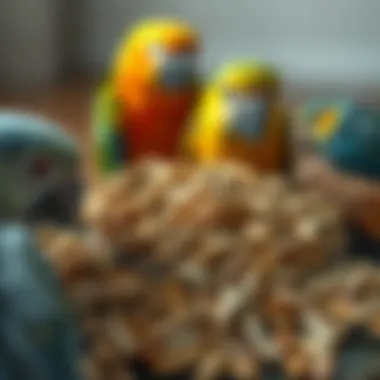
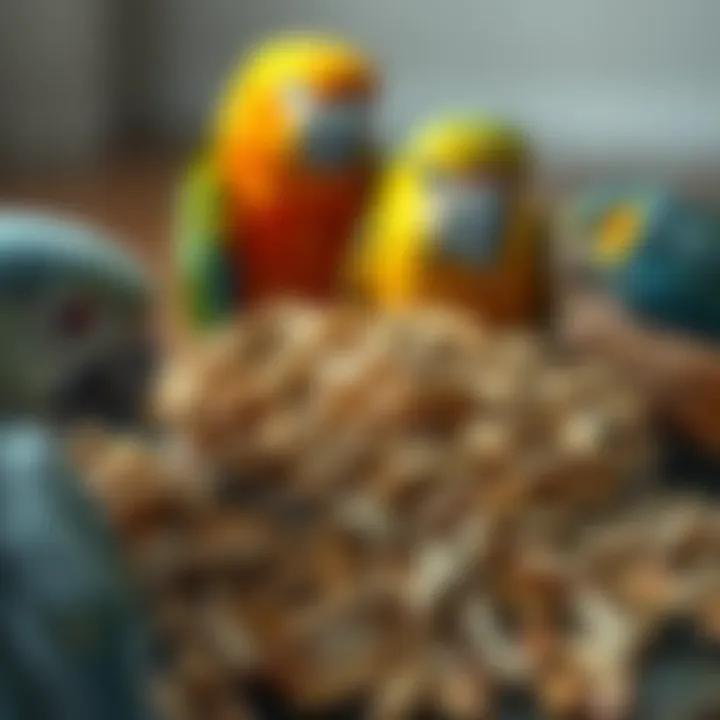
Selecting the right food for pet parrots is pivotal in nurturing their overall health and happiness. Each parrot has unique dietary needs based on its species, age, and lifestyle. Proper nutrition can significantly enhance their quality of life, improve their energy levels, and even extend their lifespan. Therefore, understanding what to look for when picking parrot food can deeply influence their health and well-being.
Quality Ingredient Considerations
When assessing parrot food, the ingredients are the bedrock of your decision. High-quality pet food features whole ingredients with a balance of nutrients. It's important to steer clear of products filled with artificial colors, flavors, and preservatives. Look for foods that prioritize whole grains, legumes, vegetables, and fruits. These components provide essential vitamins and minerals that promote good health.
Moreover, consider the source of the ingredients. Foods with organic certifications often come from farms that uphold high standards for animal welfare and environmental care. Parrots are sensitive to toxins, so ensuring their food is free from harmful substances is vital.
Also, it helps to choose a brand that maintains transparency in its ingredient sourcing. Many brands provide information on the origin of their ingredients, which can help you make an informed choice.
"Always read ingredient lists and avoid products that do not disclose the source or offer vague descriptions of ingredients."
It's beneficial to consult avian veterinary resources or websites dedicated to bird care, such as The National Bird Feeders Association or articles from avian vets.
Reading Food Labels
Understanding how to read food labels is just as critical as choosing quality ingredients. The packaging can often be misleading, so here are key aspects to consider:
- Guaranteed Analysis: This indicates the nutritional content. Pay attention to protein, fat, and fiber levels, which vary from one parrot species to another.
- Serving Suggestions: Serving sizes should match your specific bird's dietary needs, so check for guidance based on your parrot's size and activity level.
- Expiration Dates: Always opt for the freshest food. Expired food loses nutritional value, so you should look for recent production dates.
- Ingredient List Order: Ingredients are listed by weight, from highest to lowest. Ensure the first few listed are wholesome options. If fillers like corn or wheat dominate the list, the food may not be the best choice.
- Added Nutrients: Look for food that mentions additional vitamins and minerals. Nutrients like calcium and omega-3 fatty acids are beneficial for your parrot's health.
By consuming and understanding the information on the labels, you can make choices that align with your parrot's specific needs. You might consider seeking help from forums such as Reddit's r/parrots for further insights on navigating food labels and making informed choices.
Feeding Tips for Parrot Owners
Understanding how to properly feed pet parrots is crucial, not just for their nutrition, but for their overall well-being. The way a parrot is fed can influence its health, behavior, and even lifespan. It’s about more than just food; it’s an integral part of the bond you share with your feathered friend. This section will cover practical tips that every parrot owner should consider to ensure their pet thrives.
Establishing a Feeding Routine
Creating a feeding routine helps parrots feel secure and stable in their environment. Birds are creatures of habit, and following a consistent schedule can be beneficial in many ways.
- Time of Feeding: Set a specific time for meals and stick to it. For example, many parrot owners find that mornings and late afternoons work best. This mimics their natural foraging times and gives them something to look forward to.
- Portion Control: Serve appropriate portions every time. Over time, you’ll get a feel for how much food your parrot needs based on its age, size, and activity level. Remember, young and active parrots might require more food compared to older or less active ones.
- Fresh Offerings: Incorporate a variety of foods to keep things interesting. Rotate through different types of fruits, veggies, and nuts throughout the week to ensure a balanced diet.
Avoiding Overfeeding and Obesity
Feeding parrots can be a double-edged sword. While you want to ensure they’re eating enough, it’s easy to cross the line into overfeeding, which can lead to obesity and related health issues.
- Watch the treats: While nuts and seeds can be great as occasional treats, they should not make up a significant portion of the diet. Many owners might be tempted to spoil their birds, but moderation is key. High-fat foods should be limited in frequency and quantity.
- Monitor Weight: Regularly check your parrot’s weight. That’s a good indicator of whether its diet is on track. If you notice a steady increase in weight, it could be time to reassess portion sizes.
- Keep Active: Engage your parrot in activities that encourage movement. Toys that require them to climb, chew, or otherwise engage physically can help mitigate weight gain.
Monitoring Dietary Changes
Just like us, parrots can have preferences that change over time, and monitoring these changes is essential for maintaining their health.
- Adapt to Preferences: If your parrot suddenly turns its beak up at its usual favorite food, it may be a sign of a new preference or even a health issue. Be observant and adaptive, and don't hesitate to experiment with new flavors and textures.
- Note Health Changes: Sometimes dietary changes can indicate broader health issues. For example, a lack of interest in food might signal stress or illness. Keep track of any behavioral shifts to quickly address potential health concerns.
- Consult with Avian Vets: Make it a habit to consult with an avian veterinarian if you’re noticing significant dietary changes. They can offer insights that might not be apparent and guide you through any necessary adjustments.
"Healthy birds reflect the vigilance and care of their keepers. By observing routine and shifts in behavior, we can ensure the best for our feathered companions."
With these strategies in mind, parrot owners can create a feeding regimen that not only nourishes their pets but also fosters a deeper connection between bird and owner. By establishing routines, ensuring moderation, and staying vigilant about dietary changes, you'll promote a flourishing and happy life for your parrot.
Nutritional Supplements and Natural Additives
Ensuring that your pet parrot gets the ideal diet can sometimes feel like navigating a cattle stampede. There’s no one-size-fits-all approach to their nutritional needs. That’s where nutritional supplements and natural additives step in, playing a significant role in filling the gaps that may exist due to dietary shortcomings. With the right knowledge, parrot owners can take proactive steps to enhance their birds’ health and ensure they live long, vibrant lives.
When to Consider Supplements
Evaluating whether your parrot might benefit from nutritional supplements often boils down to a few key indicators. Here are several situations when you might want to consider adding these products:
- Dietary Gaps: If your parrot’s diet lacks variety, such as not getting enough fresh fruit or vegetables, then supplements can help balance the nutritional shortfall.
- Health Concerns: Birds suffering from health issues or recovering from illness often require targeted nutrients that may not be fully met through regular meals.
- Older Parrots: As parrots age, their metabolic needs can change. Older parrots may require additional vitamins and minerals to maintain their health.
- Breeding Season: Breeding and rearing young ones puts extra demands on a parrot's body. Supplements can give them the added support they need during this demanding time.
The type of supplement chosen should align with the specific needs of your bird. Consulting an avian vet can help you navigate this choice effectively.
Natural Remedies for Avian Health
Natural remedies, derived from plants and whole foods, can be a wonderful source of added benefits for your parrot. They��’re often lower in risk compared to synthetic supplements if used appropriately. Consider these options that might enhance your parrot's diet:


- Coconut Oil: This natural fat can help improve feather health and condition. It can be mixed in moderation into their regular feed.
- Chamomile Tea: Known for its soothing properties, chamomile also aids digestion and can be offered as a moistening agent for pellets or seeds.
- Spirulina Powder: A green-blue algae packed with protein, essential fatty acids, and vitamins. Sprinkling some into their food can significantly boost their nutrient intake.
- Garlic: While it must be used sparingly, garlic can aid in preventing parasites and has potential antifungal properties.
Remember: Always introduce new supplements or natural remedies slowly while monitoring your parrot's response. Sometimes their little beak just needs to explore new tastes gradually.
Using nutritional supplements and natural additives can elevate the diets of your feathered companions. It's not only about the food they consume but also understanding their holistic health needs. Balancing these aspects can lead to a happier, healthier parrot that truly thrives.
Observation: Signs of Dietary Deficiency
Understanding the signs of dietary deficiency in pet parrots is crucial for maintaining their health and vitality. Many bird owners might assume that as long as their feathered friends are eating, they are fine. But the reality is a bit more intricate. Every bird is unique, and their nutritional needs can vary widely based on species, age, and lifestyle.
To ensure your parrot thrives, it is important to monitor their physical appearance and behavior closely. Identifying early signs of a nutritional imbalance can lead to timely interventions, potentially preventing more serious health issues down the line. When the body lacks essential nutrients, it tends to exhibit certain symptoms, which can act as warning bells for attentive owners.
Physical Symptoms to Watch For
The physical signs that indicate dietary deficiencies in parrots can be subtle at first. However, careful observation can reveal these indicators:
- Feathers: Look for dull, rough, or missing feathers. A shiny, well-kept plumage is a good sign of a healthy bird, while poor feather condition often points to nutritional gaps, particularly in protein or fat sources.
- Weight Changes: Both weight loss and excessive weight gain can signal problems. If a parrot is losing weight, it might not be getting enough calories or essential nutrients. Conversely, excessive weight can imply overfeeding or an imbalance in diet.
- Eyes and Beak: Healthy eyes should be clear and bright. A dull appearance or excess tearing may indicate deficiencies, especially in vitamins A and E. Similarly, a dry, brittle beak can be a signal of nutritional concerns.
- Droppings: The droppings can reveal a lot. Consistency, color, and smell are all indicators of health. For example, an unusually watery or discolored dropping might suggest issues with the diet.
It’s a good idea for parrot owners to take note of these physical symptoms regularly as part of a comprehensive health checkup for their pets. Keeping an eye on how their bird appears physically can help nip problems in the bud.
Behavioral Indicators of Poor Nutrition
Alongside physical symptoms, behavioral changes can also indicate nutritional deficiencies. Birds are creatures of habit, and deviations from their normal behavior often signify distress. Here are some behaviors to watch for:
- Lethargy: If your parrot suddenly seems less active, it might signal poor nutrition or a lack of energy from inadequate calorie intake.
- Irritability or Aggression: A parrot that’s more irritable than usual could be suffering from deficiencies that affect its mood. Just like in humans, certain nutrients play a role in mood stability.
- Reduced Vocalization: Many parrots are known for their chirping and talking. A noticeable drop in vocal activity can be a cue that something isn’t right, which could stem from dietary deficiencies.
- Changes in Appetite: An unexpected change in eating habits, whether it be refusing food or overeating, raises red flags. It may mean your parrot is experiencing discomfort or is not satisfied with their current diet.
A proactive approach to nutritional monitoring can greatly enhance the quality of life for your parrot. Keeping an ongoing dialogue with a veterinarian specializing in avian care will also be beneficial.
Innovations in Parrot Nutrition
Innovations in parrot nutrition are becoming increasingly important as understanding of avian health deepens. These advancements not only reflect a growing regard for the well-being of pet parrots but also provide a more tailored approach to their diverse dietary needs. With modernization, bird owners can now access better-quality products and insights that were unheard of in the last decades. This section discusses emerging trends and research that are shaping the future of parrot diets, providing you invaluable information to keep your feathered friends flourishing.
Trends in Pet Bird Diets
In the landscape of pet bird nutrition, trends are like the ever-changing seasons; they can reveal much about what is healthy and beneficial. Here's what to keep an eye on:
- Increased Focus on Whole Foods: Parrot diets have shifted towards incorporating whole foods, like nuts, seeds, and fresh produce. Many owners now understand that whole foods are typically more nutritious and better for their parrots compared to heavily processed options.
- Plant-based Diets: Inspired by broader food trends, some bird owners are exploring vegetarian and vegan diets for their birds. These diets are rich in fruits and vegetables, aiming to reduce the reliance on animal-based proteins often found in traditional feeds.
- Customizable Diet Plans: With more awareness about individual dietary needs, many pet owners are opting for customizable mixes. These allow for adjusting based on bird species and even personal health issues, making it easier to cater to specific requirements.
- Alternative Proteins: There's a notable pivot toward alternative protein sources, such as insects. These are being emphasized as an essential part of a balanced diet, especially for parrots that are natural insectivores.
As the tides change, it becomes crucial to stay informed. Regular discussions in online platforms, forums like those on reddit.com, or specialized bird websites keep community knowledge vibrant, helping each parrot parent pick the right path for their companions.
Research Developments in Avian Nutrition
Amid these dietary trends, scientific research continues to progress, illuminating various facets of parrot nutrition. Insights gained from such studies can redefine what it means to feed our feathered friends:
- Microbiome Studies: Recent research has begun to explore the importance of the gut microbiome in parrots. Just like in humans, a healthy microbiome supports overall health. Innovations in probiotics and prebiotics may soon become staples in parrot diets, enhancing digestion and nutrient absorption.
- Nutrient Analysis: Advances in food technology have led to more precise nutrient analyses. This helps in creating feed that meets the appropriate levels of vitamins and minerals, tailored to different parrot species.
- Behavioral Studies: Ongoing research is focusing on how diet influences behavior in parrots. For instance, certain nutritional components may affect mood and cognitive function. This knowledge can help owners make more informed decisions that boost both the physical and mental health of their pets.
In sum, staying engaged with the latest trends and research in parrot nutrition helps foster a community that values informed decision-making. As the yardstick for caring for pet parrots evolves, embracing these innovations can lead to better health outcomes and stronger bonds between owners and their pets. Consider bookmarking relevant resources — sites like britannica.com or pet nutrition blogs are gold mines for cutting-edge information.
"Diet is not just about sustenance; it's a foundation for health, learning, and happiness for your parrot."
Through comprehending these innovations, you position yourself as a proactive caretaker. Navigating through the myriad of information available today allows for a more informed approach to parrot care, ensuring your companion thrives beautifully.
Closure: Crafting an Optimal Diet for Your Parrot
In the grand scheme of caring for pet parrots, the spotlight falls undeniably on their diet. This critical element does not merely fill their stomachs—it lays the foundation for their health, behavior, and longevity. Understanding what goes into a parrot's diet is essential for any committed bird owner or aspiring parrot parent. The right nutritional choices can make a world of difference in the vitality of these vibrant avian companions.
A well-rounded diet for parrots encompasses a variety of components, each playing a unique role in their overall health. The first step is recognizing that parrots are not one-size-fits-all; their dietary requirements vary based on species, age, and activity level. Whether you’re caring for a lively Amazon, a Graceful Green-cheeked Conure, or a dazzling Macaw, tailoring their food to suit their specific needs is crucial.
Key Considerations for Crafting an Optimal Diet
- Diversity is Key: Just like us, parrots require a mix of nutrients from various food sources. Their diet should ideally include high-quality pellets, fresh fruits, vegetables, nuts, and seeds.
- Focus on Freshness: Opt for fresh produce whenever possible. Foods like carrots, spinach, and apples not only provide important vitamins but also engage their natural foraging instincts.
- Watch Portion Sizes: All good things in moderation—this adage rings especially true in the realm of pet nutrition. Overfeeding can quickly lead to obesity and related health issues, so portion control is paramount.
Moreover, frequent observation of your parrot’s behavior and physical condition can help catch signs of nutritional deficiencies early. If your feathered friend is molting excessively or seems lethargic, it may indicate an imbalance in their diet.
"A well-nourished parrot is a colorful, lively companion, brimming with energy and joy."
It’s also important to keep up with the latest research and trends in avian nutrition. Just as human dietary recommendations evolve with new science, so do those for parrots. Engaging with expert resources, like those offered by the American Bird Association or Veterinary Universities, can help keep you informed about what is best for your feathered friend.
In summation, crafting an optimal diet for your parrot is both an art and a science. It's about striking a balance between what is nutritionally sound and what delights your pet. With careful planning, an attentive eye, and a bit of love, you can ensure your parrot not only survives but thrives—enjoying a rich, full life next to you.















